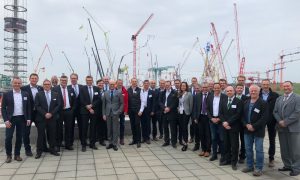Driving demand for telematics in the Middle East
Fleet management systems can help meet niche requirements

Whether it’s cutting down on fuel costs or keeping tabs on driver behaviour, the benefits of telematics have been well documented.
The region seems to be gradually waking up to the advantages of fleet management solutions, which far outweigh the initial cost.
While certain benefits like fuel savings and road safety may be common for fleets across the board, different industry segments have niche needs that telematics can help with.
Truck & Fleet ME set out to learn how telematics providers are catering to the requirements of various business verticals in the Middle East.
Oil and gas
For fleets of oil and gas companies and contractors, a key requirement is road safety, telematics providers say. Fleets in the sector tend to have a high accident rate, says Bassam Alkassar, CEO of FMS-Tech, a fleet management solution provider.
“Oil and gas companies run massive operations. One of our clients’ fleets travelled two million kilometres a month. They have road accidents regardless of how much defensive driver training they carry out for their employees. It’s always a big issue.”
Lives lost in road accidents can cost companies millions and also tarnish their reputation, he says. Fleet management solutions can go a long way towards preventing such tragedies.
FMS-Tech supplies telematics systems to the UAE’s ADNOC Distribution and ADCO, as well as multinationals like Schlumberger and Haliburton. The company installs in-vehicle monitoring systems in fleets to monitor driver behaviour and improve driving habits.
“The system records driving habits, so you can monitor what’s happening on the vehicle 24×7. If you don’t rely on technology to help you run your fleet, you know nothing about the vehicle once it leaves your parking lot.”
Brodie von Berg, sales and marketing director at MiX Telematics Middle East and Asia, also notes that reducing the severity and frequency of crashes is a key priority for the company’s oil and gas customers. “The offering is very much centred on ensuring that the drivers are safe and well trained; the vehicles they’re driving are licensed, serviced and inspected; and they understand the risks present on the roads that they’re travelling on.”
MiX Telematics generates driver performance reports based on data gathered from systems installed in customers’ fleets. The reports are sent to the client, who can identify high-risk drivers and take appropriate action.
Oil and gas customers have derived numerous benefits from investing in telematics for their fleets, Alkassar says. Clients have observed a decline in violations as well as improvements in road safety and operational efficiency.
FMS-Tech provides its customers with RFID-enabled cards for drivers, he notes. “We store on the card the driver’s name, the vehicles he’s allowed to drive and his driving shifts. It’s very important to know who’s driving the vehicle at any point in time. We use RFID technology, so it’s contactless, wireless and you can store it in your wallet.”
The nature of oil and gas operations means that fleets often travel to remote locations without cellular coverage, which can make tracking vehicles an issue, von Berg says. MiX Telematics, for instance, has many customers in Iraq that sometimes operate fleets in areas without coverage. This is tackled by using the core telematics platform enabled with additional satellite communications.
“We use smart switching technologies which ensure that we only utilise the satellite communications where it’s necessary to do so. This makes it a more cost-effective solution to provide unlimited contact with the vehicles.”
In the wake of plunging oil prices, one wonders whether oil companies will be less likely to invest in telematics as they look to trim expenses. Alkassar doesn’t seem too concerned.
“Most companies have been affected by the new prices of oil. However, our clients use us to reduce their cost. The initial investment is paid back within a few months, or maximum one year.”
Cold chain
The food and beverage industry is another sector that needs to closely monitor its fleet, especially to protect perishable cargo.
For F&B clients, the main concern is to keep reefer bodies cool, Alkassar says. Route planning is also essential, as is making sure that products are delivered intact to the right places.
FMS-Tech uses sensors to measure the temperature inside the reefer bodies. The data is sent to the main office or control centre, enabling clients to track the temperature of the unit at any point in time.
Many customers in F&B distribution tend to suffer from undocumented cold chain, and as a result are unable to provide guarantees that the cold chain has been maintained, von Berg says.
Apart from monitoring temperatures inside the reefer units, MiX Telematics also monitors door switches to detect when they’re opened, and can determine how long doors are left open for.
Brent Melvin, general manager – supply chain solutions at Abu Dhabi-based fleet management firm Massar Solutions, also notes the importance of telematics in F&B distribution. “Real-time information is the real deal in managing F&B fleets efficiently.”
In the absence of adequate telematics solutions, data on temperature deviation during transit can only be retrieved at the end of a transport leg. By this time, the cargo may have been subjected to temperature fluctuations, resulting in wastage, Melvin says. Telematics, however, can instantly alert management and drivers about the temperature so they can address the issue then and there.
“We spend a lot of time and money on telematics,” he says, noting that the company’s approach to telematics is two-fold. One aspect involves keeping tabs on temperature at all times, to assure customers that cold chain integrity is maintained.
The other aspect is operational data which pertains to the vehicle and driver behaviour. It’s important for the firm to monitor whether the driver is on the right routes, driving carefully and avoiding behaviour like harsh braking and sudden acceleration.
Long periods of idling are also undesirable. “Idling has two effects. The first is cost for the truck by burning diesel, and the second is when you’re not moving the vehicle, you’re not moving air across the reefer engine. Hence you put strain on the reefer engine, which can compromise the cold chain.”
Special applications
In addition to oil and gas and F&B distribution, telematics also plays a valuable role in many other special applications, such as cash-in-transit vehicles and hazardous goods transport.
“Cash-in-transit vehicles are obviously a high-value target in terms of security,” von Berg says. “Customers are interested in having a reliable position update from the vehicles at all times, to know where they are and what they are doing.”
MiX Telematics has even used systems to enable remote unlocking of safes in cash-in-transit applications, so that there is a central control tower which monitors when and how the safes are unlocked in the vehicles.
“Another key factor is overtime as well,” he says, pointing out that cash-in-transit drivers are usually paid hourly wages. Hence it is important to monitor the efficiency of their routes.
“We tend to find quite large discrepancies where the overtime is overstated, or it’s an inefficiency in the route.”
MiX Telematics products are also deployed in fleets transporting hazardous goods, such as radioactive materials in the oil & gas sector. These materials need to be carefully managed in terms of how they’re stored and how storage compartments are opened.
“When they’re carrying explosives, we need to ensure that we have complete RF [radio frequency] silence at times when they are conducting blasts. Telematics is an RF source, so we’ve actually engineered solutions which enable our customers to isolate all RF from the system when they’re in a hazardous area.”

























